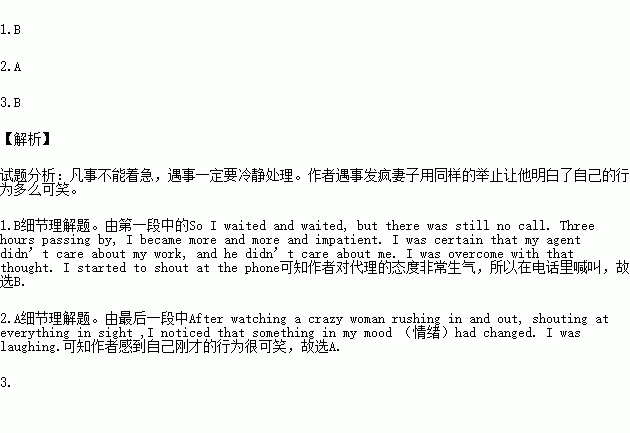题目内容
I was waiting for a phone call from my agent. He had left a message the night before, telling me that my show was to be cancelled. I called him several times, but each time his secretary told me that he was in a meeting and that he would call me later. So I waited and waited, but there was still no call. Three hours passing by, I became more and more impatient. I was certain that my agent didn’t care about my work, and he didn’t care about me. I was overcome with that thought. I started to shout at the phone, “Let me wait, will you? Who do you think you are?”
At that time I didn’t realize my wife was looking on. Without showing her surprise, she rushed in, seized the phone, tore off the wires, and shouted at the phone, “Yeah! Who do you think you are? Bad telephone! Bad telephone!” And she swept it into the wastebasket.
I stood watching her, speechless. What on earth...?
She stepped to the doorway and shouted at the rest of the house, “Now hear this! All objects in this room---if you do anything to upset my husband, out you go!”
Then she turned to me, kissed me and said calmly, “Honey, you just have to learn how to take control.” With that, she left the room.
After watching a crazy woman rushing in and out, shouting at everything in sight , I noticed that something in my mood (情绪) had changed. I was laughing. How could I have trouble with that phone? Her anties helped me realize I had been driven crazy by small things. Twenty minutes later my agent did call. I was able to listen to him and talk to him calmly.
1.Why did the author shout at the telephone?
A. He was mad at the telephone.
B. He was angry with his agent.
C. He was anxious about his wife.
D. He was impatient with the secretary.
2.What made the author laugh?
A. His own behavior.
B. His wife’s suggestion.
C. His changeable feelings.
D. His wife’s sweet kiss.
3.What does the underlined word “anties” in the last paragraph refer to?
A. Angry words B. Unusual actions
C. Surprising looks D. Anxious feelings

